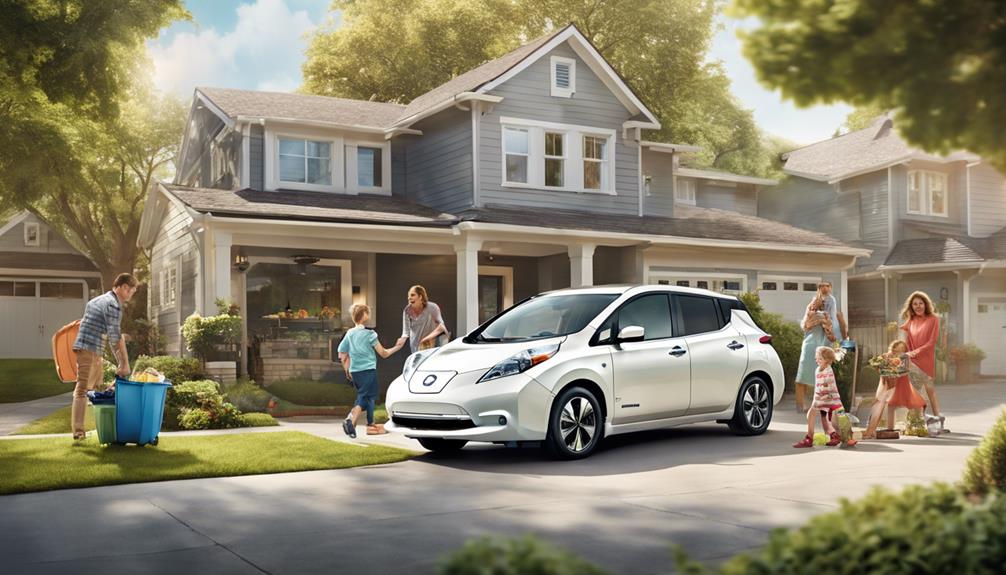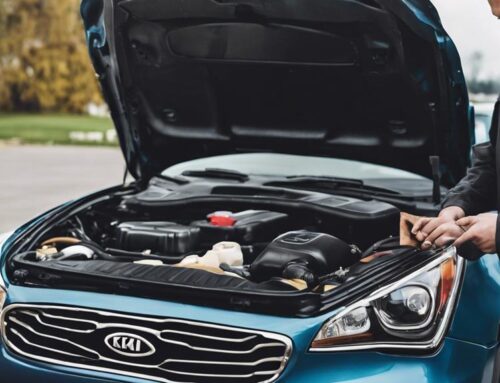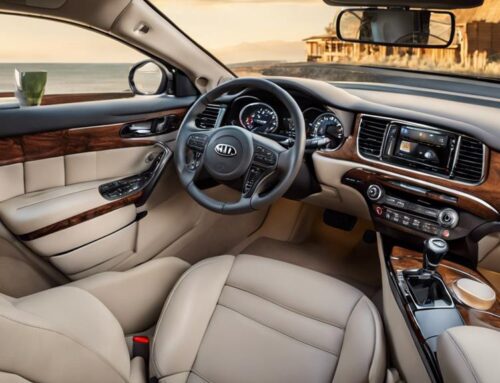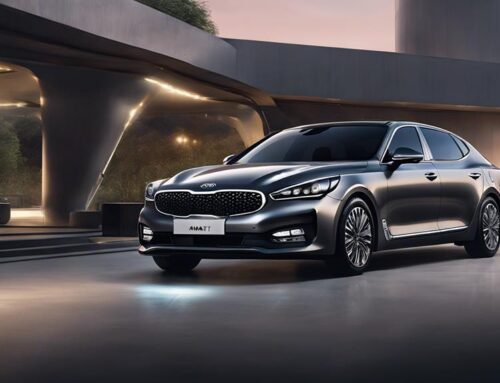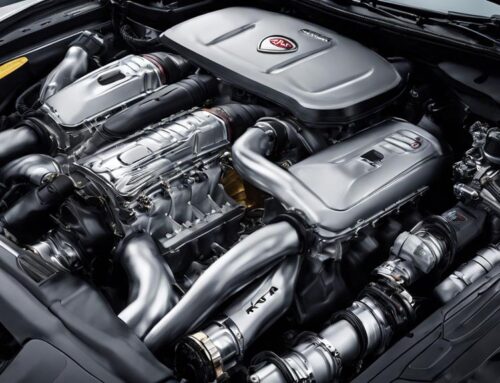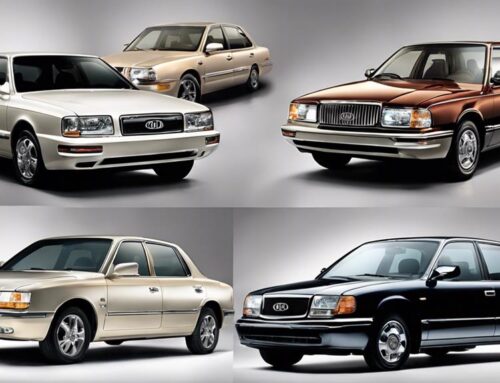Owning a Nissan Leaf offers you a cost-effective and low-maintenance driving experience. You'll notice savings from electricity costs versus gasoline and appreciate the efficiency of home charging. The electric drivetrain means fewer service needs, while battery advancements and extensive warranties boost peace of mind. Proper charging habits and regular software updates will help maintain battery longevity. Plus, real-world performance often meets, if not exceeds, expectations. There's a rich community of helpful tips and modifications for new owners. Discover what makes the Nissan Leaf a smart and practical choice for environmentally conscious drivers like yourself by exploring further.
Key Takeaways
- Nissan Leaf owners benefit from lower maintenance costs due to fewer mechanical components and reduced likelihood of breakdowns.
- Home charging of the Nissan Leaf is more cost-effective compared to traditional gasoline refueling.
- Regular software updates and proper charging habits can significantly extend the battery life of the Nissan Leaf.
- Extensive warranty coverage and DIY maintenance tasks help reduce the overall service costs for Nissan Leaf owners.
- Incentives and rebates are available to make purchasing and owning a Nissan Leaf more affordable.
Cost of Ownership

When considering the cost of ownership for a Nissan Leaf, it's important to recognize the significant savings you'll often experience compared to traditional gasoline vehicles. This electric vehicle (EV) offers numerous advantages that make it an appealing choice for those looking to innovate while keeping ownership expenses low.
First and foremost, electricity is generally cheaper than gasoline. You'll find that charging your Nissan Leaf at home is more cost-effective than frequent trips to the gas station.
In addition, many regions offer incentives and rebates for EV owners, further reducing your overall expenses. These incentives can come in the form of tax credits, reduced registration fees, or even discounted electricity rates during off-peak hours. Additionally, advancements in battery technology have improved the efficiency and range of the Nissan Leaf, making it an even more practical and economical option.
Another major saving strategy involves the lower maintenance costs associated with EVs. The Nissan Leaf doesn't require oil changes, and its electric motor has fewer moving parts than a traditional combustion engine. This translates to fewer breakdowns and less money spent on repairs.
Additionally, regenerative braking systems in EVs help extend the life of brake components, another area where you'll save.
Insurance rates for the Nissan Leaf can also be competitive due to the vehicle's advanced safety features and lower risk profiles. Some insurers offer discounts specifically for EV owners, so it's worth shopping around for the best rates.
Lastly, consider the long-term financial benefits. With rising fuel prices and increasing environmental regulations, owning an electric vehicle like the Nissan Leaf positions you ahead of the curve. You'll not only enjoy immediate savings but also be well-prepared for a future that favors sustainable and cost-efficient transportation solutions.
Maintenance Requirements
Owning a Nissan Leaf isn't just about saving on fuel and enjoying tax incentives; it's also about benefiting from minimal maintenance needs. With a streamlined electric drivetrain, the Leaf forgoes many of the traditional components that require regular upkeep in gasoline-powered vehicles. This translates to fewer service checkpoints and lower service costs, making it an attractive option for those who value efficiency and innovation.
Additionally, the advanced keyless entry systems enhance the convenience and security of owning a Leaf.
One of the standout features of the Nissan Leaf is its impressive warranty coverage. Nissan offers an 8-year or 100,000-mile warranty on the battery, while the vehicle itself comes with a 3-year or 36,000-mile basic warranty. This extensive coverage gives you peace of mind, knowing that any major issues are likely to be covered, minimizing unforeseen expenses.
When it comes to DIY maintenance, the Leaf shines. Without an internal combustion engine, you won't need to worry about oil changes, spark plugs, or timing belts. Basic tasks like replacing cabin air filters, wiper blades, and brake pads can be easily handled at home, saving you both time and money.
Additionally, the regenerative braking system reduces wear and tear on the brakes, extending their lifespan.
However, professional service is still required for certain aspects of vehicle maintenance. Critical components like the battery and electric motor should be inspected at the recommended service checkpoints to ensure prime performance. While service costs for these checks are typically lower compared to traditional vehicles, staying on top of maintenance will help you avoid any potential issues down the road.
Battery Longevity
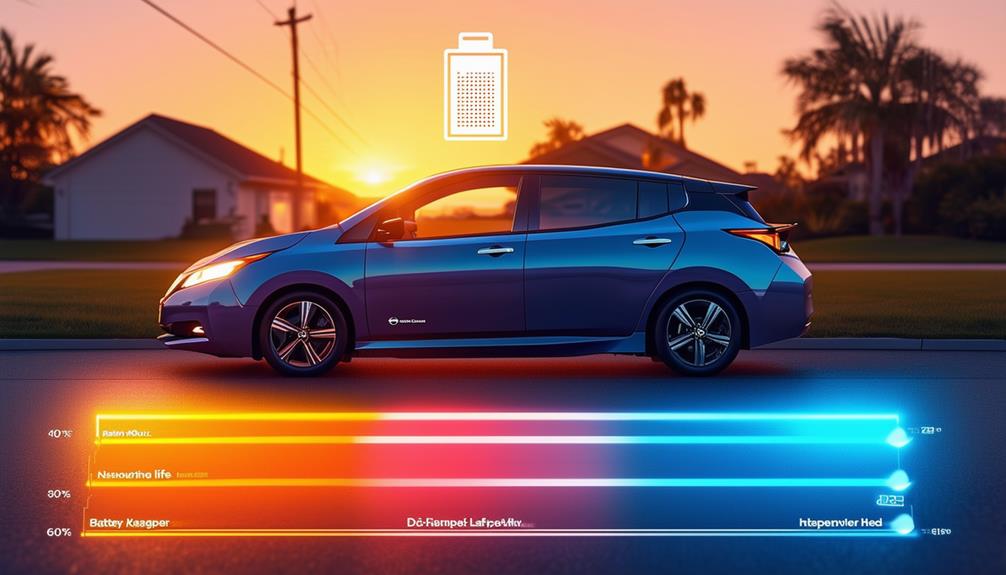
Battery lifespan is an important aspect to keep in mind in your Nissan Leaf ownership journey. As an owner, you're likely curious about how long your vehicle's battery will last and what factors can influence its longevity. Ensuring best battery health is essential to maximizing the performance and range of your Leaf.
The Nissan Leaf also comes equipped with advanced safety features that contribute to its overall reliability. For example, the smart entry system offers both convenience and added security, which can indirectly benefit the battery by preventing unauthorized access and potential misuse.
Nissan's advanced battery technology is designed to endure. However, the lifespan of your battery depends on several factors, including driving habits, climate, and maintenance. High temperatures can degrade battery health over time, so parking in the shade or a garage can help mitigate this. Additionally, Nissan provides an eight-year or 100,000-mile warranty on the battery, giving you peace of mind regarding its durability.
A robust charging infrastructure also plays a significant role in maintaining battery lifespan. Utilizing Level 2 chargers, which are widely available, can extend your battery's life compared to frequent use of fast chargers. Fast charging generates more heat, which can have a long-term impact on battery health. Hence, while fast charging is convenient for quick top-ups, it's advisable to rely on slower charging methods whenever possible.
Moreover, regular software updates from Nissan can enhance battery management systems, ensuring your Leaf operates efficiently. Keeping your vehicle's software up-to-date is an easy yet noteworthy step towards preserving battery health.
Charging Habits of Owners
Maintaining your Nissan Leaf's battery health involves more than just understanding its longevity; it also requires mindful charging habits. Your approach to charging can impact battery performance and overall driving experience. Here's how you can enhance your charging habits to keep your Leaf running smoothly and efficiently.
- Utilize Public Charging Infrastructure: Leveraging public charging stations isn't just convenient; it also helps alleviate range anxiety. With advancements in charging infrastructure, you can plan your trips around available fast chargers, ensuring your Leaf gets the juice it needs without straining the battery. Additionally, integrating these charging stops into your routine can help you take advantage of downtime to explore new locales or run errands.
- Avoid Frequent Full Charges: Charging your Leaf to 100% regularly can degrade the battery over time. Instead, aim for an 80% charge for daily use. This practice extends battery life and aligns with the Leaf's built-in management system, which enhances energy use.
- Monitor Charging Frequency: Try to avoid letting your battery drop below 20%. Consistently deep discharges can wear out the battery faster. A balanced charging routine involves topping up when your battery reaches around 20-30%, maintaining efficient battery health.
- Take Advantage of Off-Peak Hours: Charging during off-peak hours not only saves you money but can also be less stressful on the grid and your battery. Set up a charging schedule that coincides with lower energy demand periods, contributing to a more sustainable environment and effective energy use.
Real-World Performance
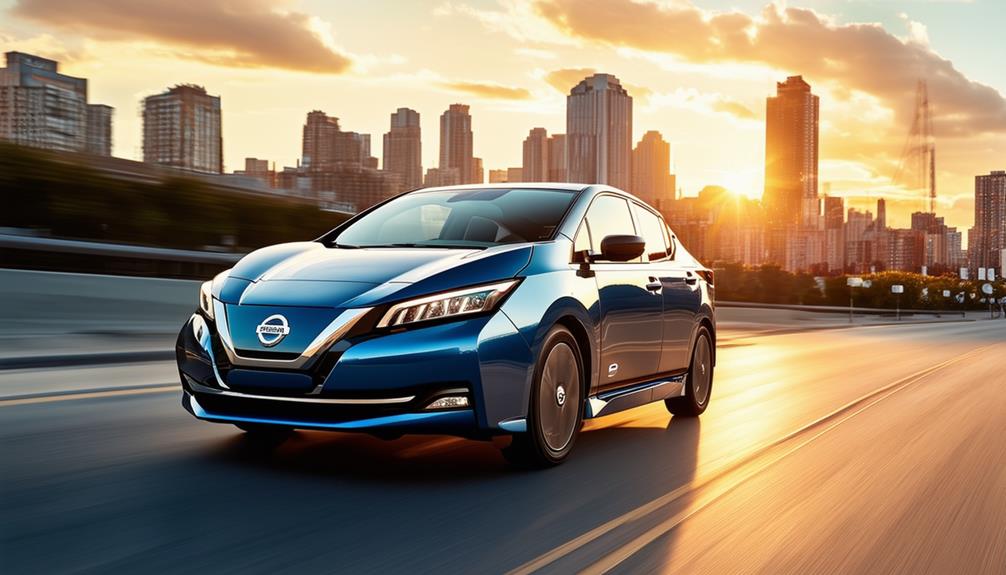
Experiencing the real-world performance of your Nissan Leaf brings the specifications on paper to life, giving you an authentic sense of its capabilities. The Leaf is designed to meet the needs of modern drivers looking for efficiency and innovation. When you hit the road, you'll quickly notice how the Leaf's electric motor delivers instant torque, making acceleration smooth and responsive. This seamless power delivery enhances your driving comfort, especially in stop-and-go traffic.
One of the most common concerns with electric vehicles is range anxiety. However, the Nissan Leaf addresses this with its efficient battery management system and regenerative braking technology. On a full charge, the Leaf offers a respectable range that can comfortably cover most daily commutes and errands. While long road trips still require strategic planning and charging stops, advancements in charging infrastructure are steadily alleviating range anxiety.
The Evolution of the Nissan Leaf includes improvements in battery technology that help extend its range.
Driving comfort in the Leaf is further enhanced by its quiet cabin and well-tuned suspension. Unlike traditional combustion engines, the electric motor produces minimal noise, allowing for a serene driving experience. The suspension system is designed to absorb road imperfections, contributing to a smooth ride. Additionally, the Leaf's interior is equipped with intuitive controls and a user-friendly infotainment system, making it easy to stay connected and informed.
In real-world conditions, the Nissan Leaf proves to be a practical and enjoyable vehicle. Its blend of performance, driving comfort, and innovative features make it an appealing choice for those looking to embrace the future of transportation. Whether you're traversing city streets or cruising on the highway, the Leaf delivers a dependable and satisfying driving experience.
Common Owner Modifications
While the Nissan Leaf excels in real-world performance, many owners find joy in customizing their vehicles to better suit their personal preferences and enhance functionality. Whether you're looking to boost the car's aesthetics or improve its efficiency, there are numerous modifications available to make your Leaf truly unique. For instance, check out stylish accessories that can add a personal touch to your vehicle.
Here are four common modifications Leaf owners often consider:
- Aftermarket Wheels and Tires: Upgrading your wheels and tires can notably impact your Leaf's performance and appearance. Aftermarket accessories like lightweight alloy wheels not only give your car a sleek look but also enhance handling and range by reducing overall weight.
- Performance Upgrades for Battery and Charging: Some owners opt for performance upgrades to the battery and charging system. Installing a higher-capacity battery or a faster onboard charger can extend your driving range and reduce charging times, making your Leaf more practical for long-distance travel.
- Interior Customizations: Many Leaf owners personalize the interior with aftermarket accessories like custom seat covers, upgraded infotainment systems, and ambient lighting. These modifications can make your driving experience more comfortable and enjoyable, tailored to your specific tastes.
- Aerodynamic Enhancements: Adding aerodynamic accessories such as rear spoilers, side skirts, and front splitters can enhance your Leaf's efficiency by reducing drag. These performance upgrades not only improve the car's look but also contribute to better energy consumption, allowing you to go further on a single charge.
Pros and Cons from Owners
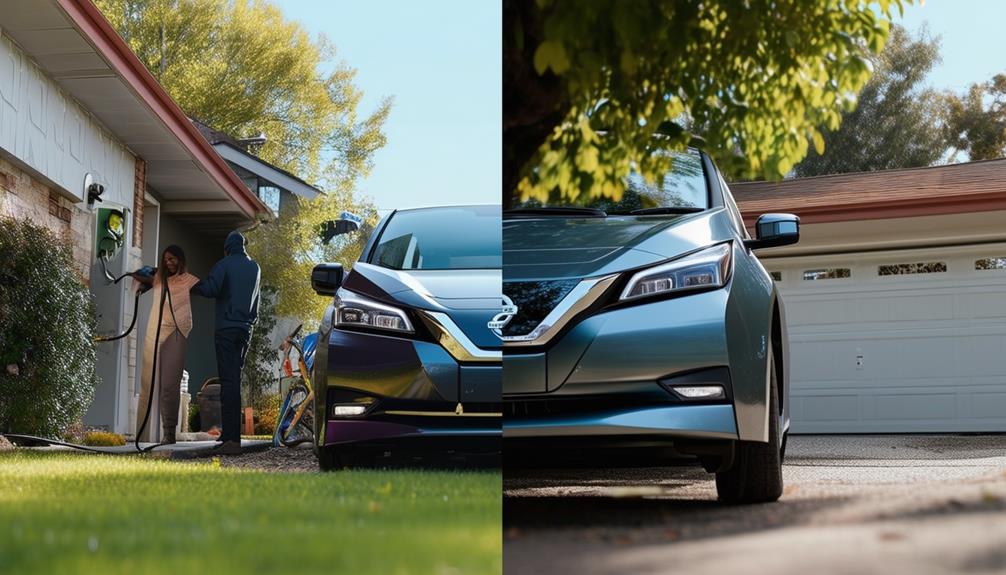
Owning a Nissan Leaf offers a unique blend of advantages and disadvantages that every potential buyer should consider. On the plus side, the Leaf is renowned for its smooth, quiet ride and zero emissions, making it an environmentally friendly choice. You'll appreciate the lower cost of ownership, thanks to reduced fuel expenses and fewer maintenance needs compared to traditional combustion engines. Its compact size and responsive handling make it a joy to drive in urban settings. Additionally, troubleshooting common issues like battery concerns or software glitches can be straightforward with the right resources.
However, range anxiety is a common concern among Leaf owners. Despite improvements in battery technology, the Leaf's range can still cause anxiety, particularly on longer trips. Planning your routes to include charging stations becomes a necessary part of ownership. While charging infrastructure is steadily improving, it's not yet as ubiquitous as gas stations, which can sometimes leave you in a tight spot if you're not careful.
On the flip side, many owners rave about the convenience of home charging. Plugging in your car overnight and waking up to a full battery can be incredibly convenient. The Leaf's regenerative braking system also helps to extend its range, which is a feature you'll come to appreciate during stop-and-go traffic.
In terms of cons, the Leaf's interior materials and overall build quality might feel less premium compared to other vehicles in its price range. Additionally, while the charging infrastructure is growing, fast chargers are still limited in some areas, which might extend your travel time on longer journeys.
Resale Value
When it comes to resale value, the Nissan Leaf has a mixed track record. As an electric vehicle, it's a pioneer in the market, but its resale trends have been less than stellar compared to traditional gasoline-powered cars. Understanding the factors that influence this can help you make an informed decision. Given the evolving EV landscape, the Nissan Leaf's position as a key player in the market could offer some positive trends in the future.
Factors Affecting the Nissan Leaf's Resale Value
- Depreciation Rates: Electric vehicles, including the Nissan Leaf, tend to depreciate faster than their gasoline counterparts. This is due to rapid advancements in battery technology and newer models offering longer ranges and better features. Typically, the Leaf depreciates around 50% of its value in the first three years.
- Market Demand: The demand for used electric vehicles can be unpredictable. While some regions with strong environmental policies may see higher demand, other areas might've limited interest. This inconsistency can affect what you can reasonably expect upon resale.
- Battery Life and Performance: One of the critical factors in the resale value of an electric vehicle is the condition of its battery. Buyers are wary of older batteries that may need replacement soon, which can be costly. Regular maintenance and battery health will greatly impact your car's resale value.
- Incentives and Rebates: Government incentives and rebates for new EV purchases can also affect the resale market. When new buyers can get substantial discounts, it reduces the appeal of buying a used model at a higher price.
Tips for New Owners
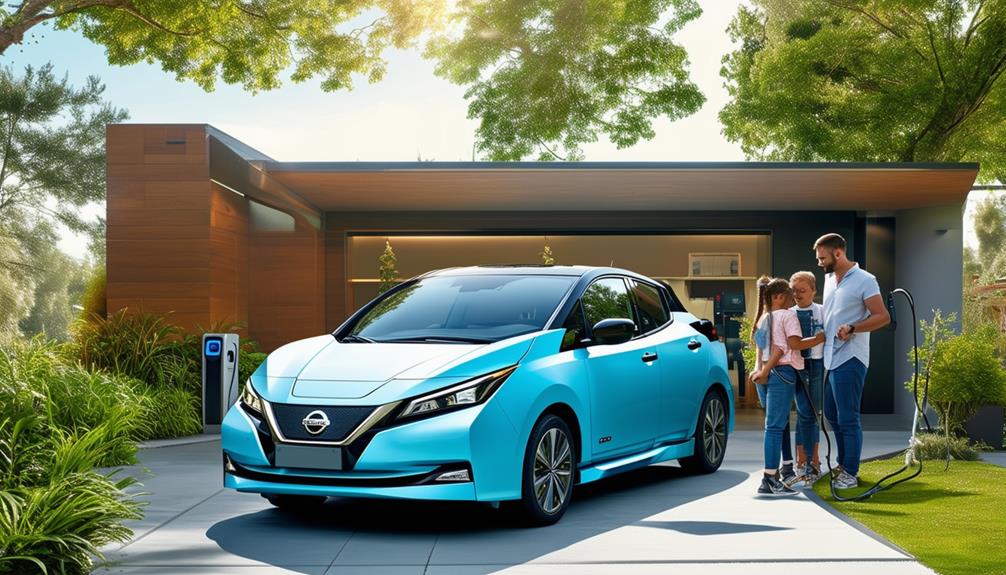
Understanding the resale value of a Nissan Leaf is just one piece of the ownership puzzle. As a new owner, you'll soon discover there's more to getting the most out of your electric vehicle.
The evolution of the Nissan Leaf has brought about notable advancements in technology and convenience, making it easier than ever to own and operate an electric vehicle. Let's delve into a few essential tips to help you navigate this exciting journey.
First, familiarize yourself with charging etiquette. Charging stations are shared resources; always be mindful of other EV drivers. Don't hog the charger—unplug your Leaf once it's fully charged. It's courteous to check apps like PlugShare to find available charging spots and avoid unnecessary waits.
Charging at home? Install a Level 2 charger to reduce time and increase convenience.
Range anxiety is common for new EV owners, but there are effective strategies to manage it. Start by knowing your Leaf's range capabilities and plan your trips accordingly. Utilize navigation apps that show charging stations along your route. Nissan's built-in navigation system is quite useful for this. Also, keep an eye on your driving habits—smooth acceleration and regenerative braking can notably extend your range.
Another tip is to keep your Leaf's software up to date. Nissan regularly releases updates that can enhance battery efficiency and overall performance. These updates might also include new features that improve your driving experience.
Lastly, take advantage of Nissan's mobile app. It allows you to remotely monitor your battery level, locate charging stations, and even pre-condition your car's cabin.
Future of Ownership Experience
As we look ahead, the ownership experience of the Nissan Leaf promises to be even more dynamic and user-friendly. You can expect a range of exciting developments that will make owning and driving a Leaf more convenient and enjoyable. Here are some key areas where you'll see significant improvements:
- Technology Advancements: The future of the Nissan Leaf is closely tied to rapid technology advancements. Enhanced battery technology will provide longer ranges and faster charging times, making your daily commutes or long trips more seamless. You'll also see improvements in autonomous driving features, offering safer and more efficient travel. In addition, newer models will feature more advanced integrations with smart keys and push-to-start, enhancing convenience and security.
- Infrastructure Development: Charging infrastructure is set to expand dramatically. With more public charging stations and faster options becoming available, you'll spend less time waiting and more time driving. Cities and highways are being equipped with next-gen charging solutions, easing range anxiety and enhancing convenience.
- Smart Connectivity: Integration with smart home systems and IoT devices will become more sophisticated. Imagine pre-conditioning your car's climate while you're still inside your house or getting real-time traffic updates synced directly to your Leaf's navigation system. These features will make your driving experience feel futuristic and highly personalized.
- Eco-Friendly Innovations: Nissan continues to emphasize sustainability. Future Leafs are expected to utilize more eco-friendly materials and processes. Recycling initiatives and energy-efficient manufacturing techniques will align with your values if you're an environmentally conscious driver.
Frequently Asked Questions
How Does the Nissan Leaf Handle in Extreme Weather Conditions?
You'll find the Nissan Leaf excels in winter driving with its advanced traction control, ensuring stability. For summer performance, its efficient cooling system keeps the battery at its best, so you can enjoy smooth drives regardless of the season.
What Are the Most Popular Accessories for the Nissan Leaf?
You'll love eco-friendly modifications like solar panel roof kits and energy-efficient tires. For tech upgrades, consider installing advanced infotainment systems and smart chargers. These popular accessories enhance your Nissan Leaf's sustainability and innovation, making your drive exceptional.
How Comfortable Are the Seats for Long Drives in the Nissan Leaf?
Imagine settling into a cloud of comfort—Nissan Leaf seats offer great lumbar support and padding. With fantastic adjustability and headrests, you'll find long drives surprisingly enjoyable and fatigue-free. It's a perfect blend of innovation and comfort.
Are There Any Specific Insurance Considerations for Nissan Leaf Owners?
When considering electric vehicle insurance for your Nissan Leaf, you should look into policies that cover unique aspects like battery replacement and charging equipment. Additionally, maintenance costs are typically lower compared to traditional vehicles, which might influence premiums.
How Easy Is It to Find Replacement Parts for the Nissan Leaf?
Finding replacement parts for the Nissan Leaf is as easy as pie. Parts availability is excellent, and there are many aftermarket options. You won't struggle to keep your Leaf running smoothly with these convenient choices.
Conclusion
Owning a Nissan Leaf brings a mix of benefits and challenges. One interesting statistic is that Leaf owners save an average of $600 per year on fuel compared to gas-powered cars. This makes the Leaf an appealing choice for budget-conscious, eco-friendly drivers. Remember to keep up with regular maintenance and monitor your battery's health. As electric vehicle technology advances, your ownership experience will likely improve, making the Nissan Leaf a smart investment for the future.

